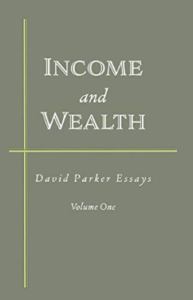Book Review: Income and Wealth
 I want to lead off here by explaining that I am not qualified to review Income and Wealth, David Parker Essays, Volume One. I am not an economist like Parker. What I know of economics I picked up at the Harvard Business School over thirty years ago. My comments on the book represent those of an average 58-year-old guy who reads the newspaper.
I want to lead off here by explaining that I am not qualified to review Income and Wealth, David Parker Essays, Volume One. I am not an economist like Parker. What I know of economics I picked up at the Harvard Business School over thirty years ago. My comments on the book represent those of an average 58-year-old guy who reads the newspaper.
Parker is a former inner-city teacher who was able to build wealth for himself through real estate investing and entrepreneurship. These twin experiences have given him insights, and a point of view, on issues that affect American society and public policy both directly and indirectly in significant ways.
This is not a book, but rather a collection of essays. They present two core ideas: that income and wealth are not the same thing; and, that government involvement in the functioning of free markets is detrimental to everyone’s wealth and prosperity. I may be oversimplifying here, but those seem to be Parker’s main points.
On the first premise, that income and wealth are not the same thing, I would say Parker is correct. And, this is a topic that many people would benefit from understanding better. While most in the mainstream argue that income inequality has led to inequality of wealth, Parker is contrarian. In his view, and likely his own personal experience, it is possible to build wealth without having a high income.
Using leverage (debt), even a person with a low income can acquire assets such as real estate and let the laws of finance do their thing. Amortizing debt over time, Parker says, a fast-food restaurant worker and his or her spouse can buy rental properties. His example may be a bit of a stretch (one uninsured emergency room visit would kill this dream in a day) but his thinking is on target, at least in my opinion. As we have no doubt seen, low income people, such as immigrants, can become wealthy, while high income folks often go broke and end up with nothing. It’s about choices and strategies.
This is not a hypothetical conversation. The idea that income disparities are a driver of social ills—and hence social policy—is at the root of many of our country’s most bitter political divides. Enormous government programs, indeed multiple generations of policymakers, have attempted to rectify the imbalance in incomes that occur across American society. If Parker’s ideas could be considered, these debates might sound different.
On his second theme, that the government should back off from the market, I think Parker’s libertarian mindset is a bit too purist to be useful. I don’t have strong opinions on this front. I’m a realitarian. He makes a generally valid point that Keynesian government involvement on the demand side of the economy can be clumsy and counterproductive. And, that it leads to unbalanced transfers of wealth that favor politically powerful groups—inflicting unintentional damage on those groups at the same time. As he puts it, Keynesian policy is not economic policy at all, but rather social policy.
That said, I think Parker does not appreciate how deeply enmeshed the government is in his theoretically free market. For example, are his low income rental property owners aware of how much the government works to stabilize the economy so their tenants can pay their rents? Before the New Deal, tenants and landlords alike ended up on the street, penniless in recurring “panics.” Parker advocates “riding these out,” but that would destroy both income and wealth. Parker might say that it’s not the government’s job to get involved in fixing these problems. This is certainly a valid opinion, but in the interest of intellectual honesty, one should recognize how the hated government helps libertarians on the income and wealth fronts.
It was a little frustrating to read Income and Wealth because I had a familiar, sinking feeling that here was another thoughtful book that used reasoned analysis and facts to make an important set of points about what’s happening in the USA—and that it would be ignored. Our public sphere has been dominated by entertaining distractions, rather than reasoned, fact-based analysis, and that’s a loss for all of us.
Our major media have focused our attention elsewhere. Over the last 25 years, instead of leading us into productive dialogues about the real economic issues affecting our lives, we have been treated to airtime hogging obsessions about whether the president ejaculated on a blue dress, why America should spend $7 trillion and 4,000 lives on an unnecessary war, how the president might be a Muslim terrorist communist Sharia-law advocating fascist (at the same time!), and the parsing of 31,000 lies told by a sociopathic crybaby who, despite having had every advantage in life, whines endlessly about how he’s being treated unfairly. These are the deep subjects of interest for the public, not income and wealth, which deserve more attention than they’re getting.
